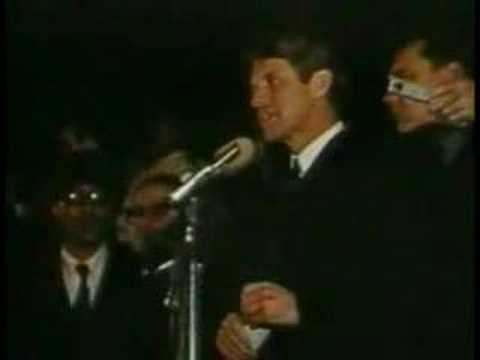 |
Craig White's Literature Courses Critical Sources
|
 |
On 4 April 1968, Dr. Martin Luther King was assassinated in Memphis. At that time Senator Robert Kennedy of New York (brother of President John Kennedy, assassinated in 1963) was campaigning in Indianapolis, Indiana, for the Democratic nomination for the U. S. Presidency.
Indianapolis police warned Kennedy they couldn't provide security for a rally he had planned that evening, and his staff urged him to cancel the event. Instead he appeared and spoke the words below. The speech is sometimes referred to as the greatest impromptu speech of the 20th century.
In the speech Kennedy speaks of the classical Greek poet and tragedian Aeschylus (525-456 BC; author of Agamemnon, The Oresteia, and Prometheus Unbound) and quotes a passage from Aeschylus's play Agamemnon about wisdom being earned through suffering.
Kennedy had learned this passage in Agamemnon from reading The Greek Way (1930) by American classicist Edith Hamilton (1867-1963). (Hamilton's Mythology [1942] remains a popular introductory textbook.)
Kennedy also cites "the Greeks" in a second passage later in the speech. The second quotation is not from Aeschylus but was also drawn from The Greek Way. The original source may have been an Athenian leader's declaration of the city's purpose.
Kennedy was assassinated two months later (6 June 1968) in Los Angeles after winning the California Democratic primary.
YouTube video/audio of Senator Kennedy's speech
![]()
Robert Kennedy speaks on assassination of Martin
Luther King
Indianapolis, Indiana, 4 April 1968
I have some very sad news for all of you, and I think sad news for all of our fellow citizens, and people who love peace all over the world, and that is that Martin Luther King was shot and was killed tonight in Memphis, Tennessee.
Martin Luther King dedicated his life to love and to justice between fellow human beings. He died in the cause of that effort. In this difficult day, in this difficult time for the United States, it's perhaps well to ask what kind of a nation we are and what direction we want to move in.
For those of you who are black—considering the evidence evidently is that there were white people who were responsible—you can be filled with bitterness, and with hatred, and a desire for revenge.
We can move in that direction as a country, in greater polarization—black people amongst blacks, and white amongst whites, filled with hatred toward one another. Or we can make an effort, as Martin Luther King did, to understand and to comprehend, and replace that violence, that stain of bloodshed that has spread across our land, with an effort to understand, compassion and love.
For those of you who are black and are tempted to be filled with hatred and mistrust of the injustice of such an act, against all white people, I would only say that I can also feel in my own heart the same kind of feeling. I had a member of my family killed, but he was killed by a white man.
But we have to make an effort in the United States, we have to make an effort to understand, to get beyond these rather difficult times.
My favorite poet was
Aeschylus. He once wrote:
"Even in our sleep, pain which cannot forget falls drop by drop upon the heart,
until, in our own despair, against our will, comes wisdom through the awful
grace of God."
[see Agamemnon, pp. 8-9, lines 212-215—different translation]
What we need in the United States is not division; what we need in the United States is not hatred; what we need in the United States is not violence and lawlessness, but is love and wisdom, and compassion toward one another, and a feeling of justice toward those who still suffer within our country, whether they be white or whether they be black.
So I ask you tonight to return home, to say a prayer for the family of Martin Luther King, yeah that's true, but more importantly to say a prayer for our own country, which all of us love—a prayer for understanding and that compassion of which I spoke. We can do well in this country. We will have difficult times. We've had difficult times in the past. And we will have difficult times in the future. It is not the end of violence; it is not the end of lawlessness; and it's not the end of disorder.
But the vast majority of white people and the vast majority of black people in this country want to live together, want to improve the quality of our life, and want justice for all human beings that abide in our land.
Let us dedicate ourselves to what the Greeks wrote so many years ago: to tame the savageness of man and make gentle the life of this world. [Not Aeschylus, but also from Hamilton's Greek Way--see below; also http://disinvoltura.blogspot.com/2009/11/to-tame-savageness-of-man-and-make.html]
Let us dedicate ourselves to that, and say a prayer for our country and for our people. Thank you very much.
![]()
![]()